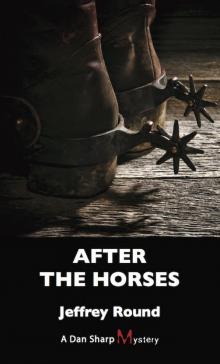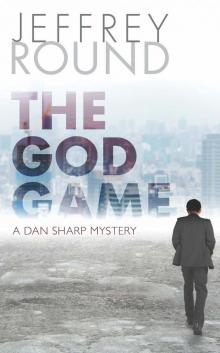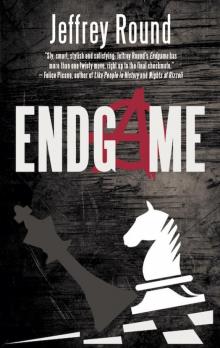- Home
- Jeffrey Round
Shadow Puppet Page 3
Shadow Puppet Read online
Page 3
Dan stopped. They were standing outside a pizza store. “Tell me again what you felt about Randy’s murder.”
“Two people, one to distract and the other to attack. I don’t think he was targeted for personal reasons. Wrong time and place is all.”
“Could it have been prevented? If Prabin had gone to coffee with him, for instance?”
“Can you outrun fate? I doubt it. As we say in Trinidad, if the bullet has your name on it you can’t outrun it forever.”
“Never?”
She gave him an odd look. “If you do then someone else has to take your place. Just to even out the scales.” She shrugged. “At least that’s what they say back home.”
They continued walking.
“Do you think whoever killed Randy is behind the disappearances you mentioned?”
Domingo shrugged. “I’m not sure, but it struck me there might be a serial killer out there who is being overlooked because he’s abducting and killing gay men rather than young girls. When it’s girls, you immediately think sex. When it’s men, it might seem more random. There’ve been at least two in the past year.”
“Spot on, I’d say. Though technically there needs to be four victims to get you a title of serial killer.”
“The count may eventually turn out to be higher than that if someone looks into it carefully.”
“Then the problem will be figuring out what the victims have in common. You need to find a connection. Meanwhile, the victim’s families live in hope and fear. Though sometimes, but not often enough, a missing person returns home without warning years later. There could be a million reasons why. You just never know.”
She glanced over at him. “How do you decide when it’s time to declare someone dead so the living can get on with their lives?”
“I don’t. I never do. I’m not God. Without proof, hope lives on forever.”
“Like a virus that never dies.”
“You know that as well as anyone.”
She smiled grimly. “Yes. Sometimes I wish I could forget him and go on, but I never will. Not till I know for sure. Even though …”
Dan looked over. “Even though you don’t believe he’s alive?”
“No, even though I don’t feel him here.” She pointed to her head. “But he is still alive for me here.” Her hand trailed down to her heart. “That will never change. There is not one single day that goes by when I don’t think about him.”
“I’d feel the same about Ked if he disappeared,” Dan said. “I couldn’t imagine ever forgetting. Alive or dead, they’ll always be a part of us.”
“But hope?” Domingo shook her head. “Not anymore. I know when he died. It was when I stopped feeling him thinking of me. One day it just ended and never came back.”
She linked her arm in his and they walked on, past the bars and store windows along Church Street. An adolescent boy clad in a corduroy jacket, loose-fitting jeans, and a newsboy cap came toward them, walking a dog wearing red boots and a bright yellow sweater.
“Dom!”
Domingo stopped. “Edie — hi!”
They embraced while the dog danced nervously to avoid having its paws stepped on.
Domingo turned to Dan. “My neighbour — Edie Foxe.”
Not a boy then.
“Hey, there. Nice to meet you,” Edie said, her voice deep and resonant.
Dan caught a slight accent. Eastern European.
“A pleasure. I’m Dan.”
“Cool.” She turned back to Domingo. “Coming to my next gig? I’ve got a show at Lola’s this Saturday. Come check it out.”
“I’ll see if Adele’s feeling sociable.”
“You tell her I expect to see her.”
“Will do.”
“Good to met you, Dan.”
“Likewise.”
She turned and walked on with the dog at her heels. Domingo caught Dan watching her go.
“Edie’s a boi,” she said.
“She kind of looks like a boy.”
“No, I mean she’s a b-o-i boi. She’s a star of the local BDSM scene. Sexual contortionist and all that exhausting stuff. Addie and I caught a late-night show where she performed a piece about being wrapped in tape. It was fascinating, though it scared the crap out of me. Addie was bored, as usual. She prefers Scrabble. I’m not into the live demos, but even hearing about it was an eye-opener for a naive island girl like me.”
They came to a stop.
“Here I am,” Domingo said, reaching up to kiss Dan’s cheek. “Thanks for walking me home.”
“Any time. Say hello to Adele for me.”
“Will do.” She turned to the front door then looked back. “Think about my offer. I plan to see you married off one way or another.”
“I hope you’re patient.”
“I am.”
On his way back down the street, Dan stopped in at Cumbrae’s and picked up a couple of steaks for himself and Ked. A growing boy could never have too much protein, he reasoned. He thought again of Domingo’s son. Lonnie had shown signs of a mental disorder before disappearing just after his sixteenth birthday. Two years later Domingo had had a brief phone call from him, sparking hope once again, but nothing since. She’d held out hope till then, but after that she no longer believed he was alive. She’d grown resigned to it, she said, but that didn’t make the acceptance any easier.
The snow was flying when Dan walked out of the store with his groceries. Outside a bar, a poster caught his eye. Tattered and faded, it looked as though it had been there for some time. Dan found himself staring at the face of a good-looking man around his own age dressed in black leather. A shaved head and smiling eyes with plenty of laugh lines. He looked familiar. Beneath the photo were the words MISSING — HAVE YOU SEEN JOE?
THREE
Missing
THE FACE OF THE MISSING man haunted Dan all the way back down Church Street. Do you think someone is preying on gay men in the community? Domingo had asked. Preying was one thing. Kidnapping was another. In the transient downtown community, faces came and went from one day to the next. Someone you thought of as a neighbourhood fixture might vanish suddenly, only to turn up on a street in Vancouver or Halifax the next time you visited there. The city had grown far too big to keep track of everyone who came and went. What had once seemed a tight-knit inner-city of individuals banding together for identity as much as safety was now a vast sea whose restless swell never stopped.
Dan recalled a popular bar he’ d frequented in his twenties — before becoming a father — and all the friends he made there. One by one they’d disappeared, leaving him to surmise who had succumbed to AIDS, who had taken a job abroad, and who had simply hooked up with a partner and settled elsewhere. The bar had lived out its allotted lifespan before closing and being transformed into a Starbucks.
One day while walking on Church Street, he saw a notice for a reunion on the tenth anniversary of the bar’s closing. Feeling nostalgic, he called up Donny and they went together. That night, he was happily surprised to see dozens of faces he hadn’t seen in a decade. Some had grown fat, while others stayed sleek and youthful. Some had lost their hair and others had grown beards. Not all had died or moved away, he realized. They’d just gone out of circulation, like old postage stamps.
The lights were off when he arrived home. The snow had picked up, great swirls drifting from the sky. The house appeared diminutive, just one more indistinct outline along the street, as though someday it might disappear forever. Tracks showed on the walkway, boot prints surrounded by paw marks. Ked and Ralph had gone for a pre-dinner walk.
Dan headed up to his office. There was still time for a bit of sleuthing before supper. He turned on his computer and searched for murdered or missing men in Toronto. The list was far too lengthy. He narrowed the search to within the past two years, but still found it daunting. The only thing distinguishing the current year from any other was the number of teens who’d been killed. Barely out of childhood, they’d been picked
off before their prime. Some of the deaths were gang-related; others appeared to be innocent victims of drive-by shootings. It did nothing to reassure him as the parent of a quickly growing teenager.
Typing the name Joe failed to bring up anything current. Nor did adding the words gay or homosexual, though a number of past cases were revealed in depths as far back as 1967. What struck him, however, was how few disappearances or murders were tagged as pertaining to gay men, all the victims apparently having been lumped in together.
One link yielded an interview with a convicted murderer who claimed to have killed more than a dozen times, picking on the socially and physically vulnerable, gay men in particular. He boasted how he’d become skilled at baiting and killing them. His preference for using a knife might have made him a shoo-in for the murder of Randy Melchior, except that he was currently in prison serving a life sentence.
He described several locations where he’d killed, hinting at where his victims’ remains might be found. The eerie nonchalance of his claims and his apparent enjoyment of the memories were unsettling. The article warned that he would kill again. Indeed, a follow-up link a month later reported his latest victim had in fact been his cellmate. Not too difficult to find that body, Dan mused, wondering what improbable universe prison officials lived in that convinced them serial killers should have cellmates.
Randy Melchior’s name brought up surprisingly few hits. The Toronto Star ran the longest article. It was scant on details except to say police were investigating what appeared to be a straightforward street robbery.
The memorial service was played up. No doubt it would make a brief ripple on the nightly news for the next few days then disappear, just one more instance of the increasing violence in the city’s downtown core. Hardly a weekend went by now without a shooting or stabbing. Torontonians had been lucky till then, but the tide was turning and there were plenty of armed youngsters ready to murder their way into history.
It occurred to him that a disappearance from the gay neighbourhood might be listed on a community billboard. The 519 Community Centre had a link. He clicked and found himself staring at the face from the poster. He knew now why it was familiar. Joe had been a contender in a leather competition several years earlier. Dan had been there that night. Despite Joe’s intimidating gear, Dan’s first impression was that he was a friendly, likeable fellow. And he’d be the first to say not to judge a book by its cover or a Mr. Leatherman contestant by his attire.
A second photo caught his eye. Adam Carnivale, a dancer at a local strip club, had been reported missing at the beginning of summer. Also good-looking, he was younger and more muscular, with broad cheekbones and full, sensuous lips. Dan thought he caught a hopeless look in his eyes, as though he’d had a hard ride in life.
Downstairs, the front door opened and closed. Dan closed his computer. Ked had returned with Ralph, the ginger retriever who had been his sidekick since he was four. Ralph was verging on his golden years in more ways than one. At seventeen, Ked had just begun morphing into manhood. His eyes were dark, unlike his father’s glacial grey. He wore his hair in a long, shaggy cut that fell around his ears.
“Hi, Dad!”
“Welcome back.”
Ked hung Ralph’s leash on the door handle and headed for the kitchen. He grabbed a chocolate bar, tore it open, and wolfed it down.
“Don’t ruin your supper.”
“Why do parents always say that?”
“It’s our job.”
“Don’t you want me to be full and happy?”
“Happy, yes. Full, no.” Dan pointed to the table, where a cutting board was laid out with a knife alongside carrots, onions, and potatoes. “Supper will be ready in half an hour.”
“Need help?”
“Sure. Make yourself useful.”
Ked sat and chopped, tossing Ralph a carrot top now and again. Dan eyed the dog, who spent a long time fussily chewing the rinds before spitting them onto the floor. Ked saw his father eying the mess.
“Don’t worry, I’ll clean it up.”
“I thought the saying was dogs have masters and cats have servants. Ralph seems to have turned the equation around on you.”
Ked reached down and hugged Ralph, who gave him a sloppy lick. “It’s okay. He’s worth it.”
Dan laid the steaks in the pan. The raw flesh sizzled on contact. He looked over to where his son sat chopping an onion. Whatever Ked did, he seemed to do happily, mostly to Dan’s relief but also to his consternation. He’d always thought a boy’s teen years were supposed to be his most troubled. Had he gone wrong as a parent? When did angst come in to fill the void and make Ked more normal and miserable?
Once, Dan had spared Ked the more upsetting details of his cases. At some point not long after the drive-by shooting of one of Ked’s school friends, however, he realized it was pointless to whitewash the world for him. Ked would encounter it in all its broken glory soon enough, and if a little forewarning would help then Dan wanted his son to have that. Other parents moved to the suburbs thinking they were shielding their children, only to discover different kinds of threats waiting there. Moving to a pleasant-looking neighbourhood did not make them better kids. It merely left them bored and more inclined to personal deviousness.
“When you’re out walking around the streets at night, do you stay alert to who and what is around you?”
Ked let his eyes search the room as though this might be a trick question he was being trapped into answering before invisible witnesses.
“I guess.”
“The city’s not as safe as it used to be.”
“I try to be aware.”
“I’m not trying to make you paranoid, but it strikes me there are a lot more shootings and knifings in the news now that we didn’t hear about even ten years ago.”
“Yeah, some kids bring knives to school. Or so I’ve heard.”
The aroma of frying steak filled the air. Dan swept Ked’s pile of onions into the pan and pushed them around with a wooden spatula.
“Would you report it if you saw one?”
Ked put down the knife and looked at his father. “I guess it depends on who had it.”
“Meaning?”
“Meaning, if I thought it was someone who was just doing it to show off I might not say anything, but if it was someone like Wayne Dumfries, who has a history of violence, I might tell one of the teachers.”
“I hope you would tell them, not just might tell them. You wouldn’t want to think later that you could have saved someone’s life if you had only alerted the right person.” Dan waited and watched as Ked went back to his cutting. “Does that make sense?”
“Yes.”
“So, please. Make sure you do alert someone, even if it’s just a prank. School is no place for weapons.”
They worked in silence for another minute.
“You might be wondering why I’m telling you this,” Dan said. “I was at a memorial service today with Uncle Donny and Prabin and Domingo. A friend of Prabin’s was murdered last week. It was a knife attack.”
“I saw it on the news,” Ked said. “That doctor, right?”
“Yes, that’s the one.”
“Who did it? Did they catch him?”
“Not yet. And no one knows if it was a him or a her or a them. You can’t make assumptions like that anymore.”
“Statistics say that eighty-eight percent of violent crimes, including murder, are committed by men. Also, I read that seventy percent of murders are committed by family members and acquaintances rather than strangers.”
“Well, I’m glad you know your statistics, but don’t make assumptions about real life. It’s often far more complicated than statistics.”
Dan transferred the steaks to a platter, scooped the onions on top, then set the platter on the table.
“Now, before I make your young life any more serious than it needs to be, why not tell me what you’re up to?”
“Elizabeth and I are going to see Leste
r’s band on Friday. It’s her birthday.”
“Right. Always keep the girlfriend happy. What’s the band called again?”
“M-Power. It’s Lester on horn and another guy on bass and one on keyboard. They’re pretty cool. Hip hop and some rap. Lester’s really stoked about this gig. It’s at a warehouse in the east end.”
“A likely place for weapons,” Dan said without thinking.
Ked looked askance. “I never thought about it. They’ll probably have a bouncer at the door frisking people.”
“If they don’t, then don’t go in.”
Ked looked at his father for a second then nodded: easier to agree than to argue, Dan suspected. He speared a steak and pulled it onto his plate before passing the platter to his father.
“Is Lester still in touch with his birth parents? Does he talk to you about that?”
“He talks to his mother on the phone now and then. He said his stepdad doesn’t want to talk to him.”
After rescuing Lester from the streets, Dan had asked Donny to take him on as a temporary charge. The charge had now lasted more than three years. Once he’d reached the age of majority, Lester had opted to stay with Donny rather than return to his drama-laden family and their condemnatory, narrow-minded beliefs.
“Is it hard on him or is he okay with that?”
“He’s okay with it. I guess she tries to pressure him to come home, but Lester knows he’s better off with Donny and Prabin than going back to Oshawa.”
“Keep your eye on him. If he ever starts to talk about going back, let us know. It was a disaster the last time he did that, but I wouldn’t put it past his mother to try more emotional blackmail on him.”
“Nah. Lester’s too smart for that now. It won’t happen again.”
“Good.” He paused and watched Ked eat. “How’s the food?”
“Great, Dad. Thanks. You’re the best.”
“So are you. Now finish everything on your plate and make me happy.”
FOUR
Cupid’s Bow
TRUE TO HER WORD, DOMINGO set Dan’s inbox ringing with queries from eligible suitors. Out of consideration for her efforts, Dan replied to them all but begged off the first round of senders. Just looking at the subject-headers demanding his attention made him feel tired. Then curiosity got the better of him and he started examining the queries in detail.

 After the Horses
After the Horses Lion's Head Revisited
Lion's Head Revisited Shadow Puppet
Shadow Puppet Lake on the Mountain: A Dan Sharp Mystery
Lake on the Mountain: A Dan Sharp Mystery The God Game
The God Game Dan Sharp Mysteries 4-Book Bundle
Dan Sharp Mysteries 4-Book Bundle P'town Murders: A Bradford Fairfax Murder Mystery
P'town Murders: A Bradford Fairfax Murder Mystery Endgame
Endgame A Cage of Bones
A Cage of Bones